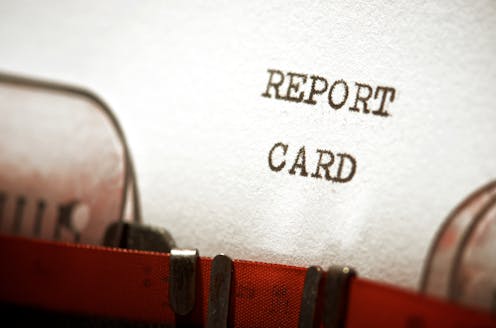
It’s that time of the year when reports on student learning come home. Anxiety for students and their parents and caregivers often tags along.
Long gone are the days when a school report was handwritten page, with wisdom like “tried hard, but needs to try harder”, along with percentages or letter grades.
Now students get multi-page reports, with a dazzling array of verbal and sometimes graphical data. Most require significant time to digest and interpret.
But despite all the effort schools make to produce these documents, parents can finish a report and have little idea whether their child is doing OK.
How did we get here?
A major part of the problem is Commonwealth regulation on education. This requires schools to provide a report to “each person responsible” for a student “at least twice a year”. It must also be “readily understandable” to a parent or caregiver.
For students from Years 1 to 10, the report must give “accurate and objective assessment” of the student’s progress and achievement, including an assessment of the student’s achievement:
against any available national standards
relative to the performance of the student’s peer group
reported as A, B, C, D or E (or on an equivalent five-point scale) for each subject studied, clearly defined against specific learning standards.

Read more: How to talk to your child about their school report
Information gets swamped
We see the well-intentioned desire to provide parents and caregivers with timely and useful information becoming swamped by the rest of the requirements around reports.
The combination of the regulation’s demand for accurate, objective standards, relative to the peer group, and on a five-point scale is a recipe for communicating a lot of words and overwhelming data. The language used can also be inconsistent or not clearly defined.
Both a 2019 Australian Council of Education Research review and anecdotal reports suggest parents do not find reports particularly clear or helpful. Or as some described them to The Sydney Morning Herald in 2018, “sterile and technical” and “next to useless”.
Focus is also on achievement at certain points (say, the half-year mark), rather than learning progress. And that doesn’t take into account the increasing number of Australian households where English is not the language spoken at home.
Read more: Report cards' report card: showing potential, but with room for improvement
How does this fit with other ideas about school?
This highly standardised approach also conflicts with other trends in education. There is a growing understanding we need to take a more individualised and flexible approach to support all kinds of learners at school.
This includes the move towards personalised learning, flexible curriculum progression, and using online assessment tools that show students’ ongoing progress.
But don’t hold your breath the regulations will change any time soon.
The government is consulting with parents, schools and communities about the next National School Reform Agreement, which is due to begin in 2025, but this does not specifically ask about reports.
Read more: What is the National School Reform Agreement and what does it have to do with school funding?
Some schools do it differently
However, some schools are already doing reports about student learning very differently, albeit with very different philosophies and practices.
Some Australian schools are using personalised curricula and reporting through practical projects such as an album of recorded music to demonstrate a student’s progress.
Others schools focus on “dispositions towards learning” that prioritise entreprenurial skills and innovative thinking that will set them up for post-school life.
Other schools get students to draw evidence from their curricular and co-curricular achievements that build towards a microcredential mapped to the Australian Skills Quality Authority. Microcredentials are short skills-based courses, that can be counted as part of a larger certificate or diploma.
Non-profit education organisation Learning Creates Australia has developed a “new metrics” framework for the senior years of high school. This redesigns the current focus on tests and scores, that (incorrectly) assumes the goal for all secondary students is to go to university. They suggest a broader student profile which includes learning progress in areas of particular interest and relevance to students.
Other schools are taking a classical approach. Students study classical literature, mathematics, and science along with philosophy and aesthetics. Assessment relies on the teacher’s judgement about the student’s progress, rather than prescribed “predicted outcomes”.
Reporting includes formal documents, but also regular conversation between parents, teachers, mentors and students.
Schools and parents can create alternatives
All these alternative approaches place critical thinking and creativity at the core of their learning philosophy, assessment, and reporting. Each prioritise evidence of student learning that is meaningful to them and their community.
This suggests standardised reporting on a five-point scale leaves a lot to be desired. But until regulatory constraints change, they’re here to stay for the foreseeable future.
Perhaps it’s better, then, for school communities to create better solutions for themselves. Each of the examples here show how powerful learning can be when parents and caregivers are meaningful partners with the school, rather than passive recipients of predetermined outputs.
Paul Kidson does not work for, consult, own shares in or receive funding from any company or organisation that would benefit from this article, and has disclosed no relevant affiliations beyond their academic appointment.
This article was originally published on The Conversation. Read the original article.







